8A chapter2 language第二课时
八年级英语上unit2第二课时
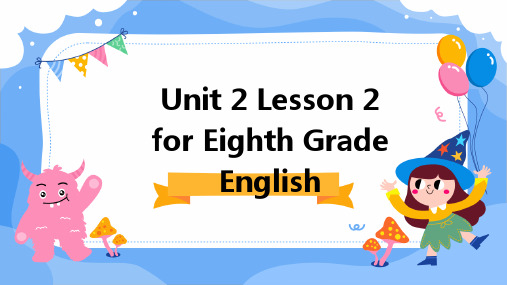
2. They will gain a deeper application for the arts and
culture of the period
3. Students will learn to apply different viewpoints and respect the opinions of others
04
4. They will learn to collaborate and work effectively in a group
setting
Emotional goals
1. Students will develop a sense of maturity about the Renaissance and its impact
Advantages
Collaborative learning can cultivate students' teamwork spirit and communication skills, while promoting mutual learning and growth.
04
Teaching process
Import process
01 02
Introduction of Topic
Begin by introducing the topic of the lesson, which could be through a story, a real life scenario, or a question and answer session to engage students
Definition
[译林版]8A Unit2 language points知识点
![[译林版]8A Unit2 language points知识点](https://img.taocdn.com/s3/m/a01d3106ccbff121dd3683db.png)
8A Unit2 language points1 .have to+动词原形不得不,必须(客观)must 必须(主观)They have to work harder2.What`s school like? 学校是什么样的?它就像看电视It`s like watching TV.3. Practise doing sth 练习做某事加动词ing的动:like , enjoy, mind, finish, keep,spend.4.fewer advertisements 更少的广告5.British English/American English 英国英语/美国英语6.a mixed shool 一所男女混合学校7.during the week 在一周期间8.discuss sth with sb 和某人讨论某事Discuss -----discussion(名)9. listen carefully to my problems. 认真倾听我的问题10.offer sb help=offer help to sbOffer—offered---offering11.seem to do sth 看起来要做某事(1). Seem(系动词) +形容词(2)seem to do (3)It seems that + 从句He seems very angry/You seem to be angry/It seems that you are angry12.do sports 做运动13.Among all my subjects, I like French best..在所有的科目中,我最喜欢法语。
14.Learning foreign language is fun. 学习外语很有趣。
15.twice a week 一周两次提问用How often.st month 上个月17.near the end of the week. 一周将要结束的时候。
牛津8AUnit2知识点归纳、难点解析、语法复习
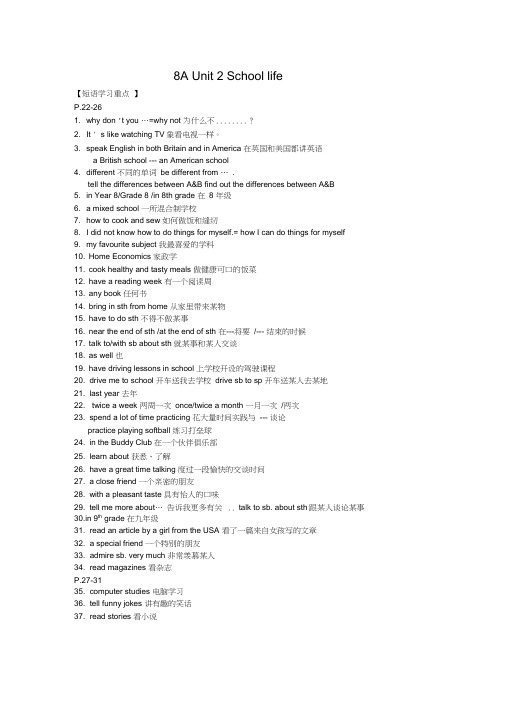
8A Unit 2 School life【短语学习重点】P.22-261. why don ' t you …=why not 为什么不........ ?2. It ' s like watching TV象看电视一样。
3. speak English in both Britain and in America 在英国和美国都讲英语a British school --- an American school4. different 不同的单词be different from … .tell the differences between A&B find out the differences between A&B5. in Year 8/Grade 8 /in 8th grade 在8 年级6. a mixed school 一所混合制学校7. how to cook and sew 如何做饭和缝纫8. I did not know how to do things for myself.= how I can do things for myself9. my favourite subject 我最喜爱的学科10. Home Economics 家政学11. cook healthy and tasty meals 做健康可口的饭菜12. have a reading week 有一个阅读周13. any book 任何书14. bring in sth from home 从家里带来某物15. have to do sth 不得不做某事16. near the end of sth /at the end of sth 在---将要/--- 结束的时候17. talk to/with sb about sth 就某事和某人交谈18. as well 也19. have driving lessons in school 上学校开设的驾驶课程20. drive me to school 开车送我去学校drive sb to sp 开车送某人去某地21. last year 去年22. twice a week 两周一次once/twice a month 一月一次/两次23. spend a lot of time practicing 花大量时间实践与--- 谈论practice playing softball 练习打垒球24. in the Buddy Club 在一个伙伴俱乐部25. learn about 获悉、了解26. have a great time talking 度过一段愉快的交谈时间27. a close friend 一个亲密的朋友28. with a pleasant taste 具有怡人的口味29. tell me more about… 告诉我更多有关.. talk to sb. about sth跟某人谈论某事30.in 9th grade 在九年级31. read an article by a girl from the USA 看了一篇来自女孩写的文章32. a special friend 一个特别的朋友33. admire sb. very much 非常羡慕某人34. read magazines 看杂志P.27-3135. computer studies 电脑学习36. tell funny jokes 讲有趣的笑话37. read stories 看小说38. score the most points 得分最高39. plant trees 植树40. the three of us 我们三人41. a ll the students 所有学生42. a glass of water 一杯水43. online friends 网友44. the same as 禾口…——样45. differe nt from 和...不同P.32-3746. have 3 days off 放三天假47. wear school uniforms 穿校服48. have three Computer Studies lessons 有三节电脑课49. have three Grade 8 classes 有三个8 年级班级50. hurt one'sleg 伤了某人的腿51.look out of the window 朝窗外看52. move to … 搬到… ..53. school uniform 校服54. go on a school trip to someplace 到… 进行一次学校旅行55. join a club 加入一个俱乐部56. a big dinning hall 一个大餐厅after-school activities 课外活动57.listen to pop music 听流行音乐listen to good music58. on one side …..on the other side—边….在另一边59. (be) the same size as...和有相同的尺寸【句型学习】1. Why don't dogs go to school? 狗为什么不去上学?2. What is school like? It is like watching TV . 学校像什么样子呢?它就像看电视。
牛津英语8A unit2 第二课时教案
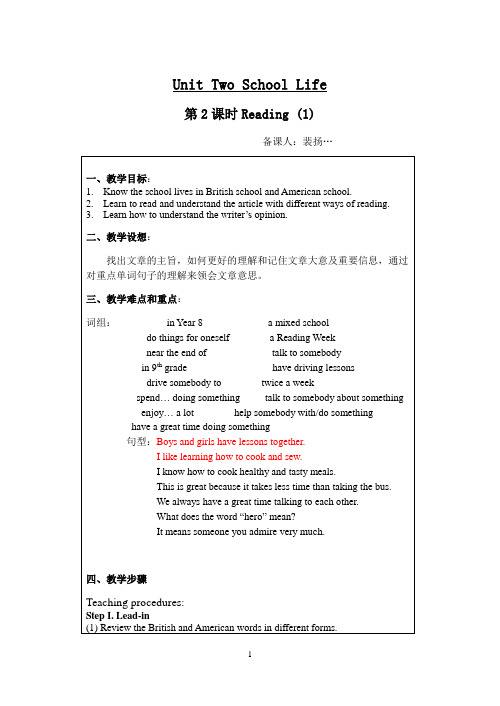
We always have a great time talking to each other.
What does the word “hero” mean?
It means someone you admire very much.
have a great time doing something
句型:Boys and girls have lessons together.
I like learning how to cook and sew.
I know how to cook healthy and tasty meals.
spend… doing something talk to somebody about something
enjoy… a lot help somebody with/do something
六、布置作业:
1. Recite the new words and read the text.
2. Finish the exercises in the workbook.
Use Questions 4-7 to sum up Paragraph 2.
Task5Read Paragraph 3 and answer:
8. Does she have a good time during lunchtime?
9. What do they sometimes do after school?
Task 2Listen to the tape and read after it.
牛津英语8AUnit2教案设计

⽜津英语8AUnit2教案设计⽜津英语8AUnit 2教案设计Unit2 School life主备⼈:赵⽟琴Period 1 Comic strip and welcome to the unitTeaching aims and demands:1.Talk about the school life and review the words about school life.2.Learn different words which mean the same thing between British Englishand American English.3.Learn the differences between British English and American English. Teaching difficulties and importance:1.Grasp the spelling of British words and American words such as lift andelevator, post and mail, film and movie, football and soccer, and so on.2.Know the differences between British English and American English.3.Grasp the words: British, lift, post, eraser, fall, elevator, math, movie, soccer4.Grasp the phrases: be smarter than, be like doing5.Grasp the sentences: Why don’t sb do sth?=Why not do sth? What’s schoollike?Teaching preparation:pictures, recorder, computer, and the flags of Britain and EnglandTeaching steps:Ste pⅠLead-inT: Do you like our school? / What do you like?How many subjects do you learn? / Can you tell me some names of them? S: Chinese, Math, English, PE, Geography, etc. (Encourage the Ss to say more about it.)T: Good. Is there another word for Math?S: Yes. Maths.T: Great. Maths is Math. Maths is British English. While Math is American English (write on Bb)Ste pⅡPre-task (Welcome to the unit)Show the flags of the UK and the USA. Tell them that people speak English in both Britain and the USA , but sometimes they use different words which mean the same thing.T: I know many boys like playing football.Do you know what it says in American English?S: Soccer.(Write on Bb)Do you know the same use of other words? Please give me some examples. Write other right answers of the students on the Bb.Teach the students the new words:BE=British English AE=American EnglishBE autumn lift football maths rubber post groundfloor secondary schoolAE fall elevator soccer math eraser mail firstfloorhigh schoolSte pⅢWhile-taskTask1 Practise the new words more. Pay attention to the pronunciations and spelling.Task2 Finish Part A on Page 23. Teacher can give more words, such as sweetsand candies, holiday and vocation, biscuit and cookie and so on.Task3 Write down both the British and American words, then finish Part B.Ste pⅣDifferent spellings(1)Say: There are also some differences in spelling between British English andAmerican English. Make a table and write down some words. E.g. favouriteand favorite, centre and center.(2)Ask Ss to find more different words means the same thing and differentspellings after class.Ste pⅤComic stripsDo you remember Hobo and Eddie? They are talking about school life.Listen to the tape and answer : What does Eddie think of the school life?Listen again and read after it.Point out: Why don’t you do sth?=Why not do sth?be smarter than, be like doing sth, there be, few/a fewLook at the picture and practise the dialogueAct the dialogue in groups and pairs.Ste pⅥFree talk about Ss’ ideal schoolWhat do you like more about school, the assembly, the classes, lunchtime or theafter-school activities? Do you like outdoor activities? Do you like fewer lessons?Do you like the lessons on the Internet? Talk about the above questions in groupsand then make a report.Ste pⅦPost-taskFill in the blankets with American English:It’s my first day in high school. I felt a little tired, but I had a good time.Our classroom is on the_______ (ground/first) floor. So we don’t needan_______(lift/elevator). I like to go outside playing________(soccer/football) after class. It’s my_________ (favourite/favorite) sport. Today we had 6 classes.I still found________(maths/math) was too difficult for me. But the new classmate next to me helped me work out a difficultproblem.Ste pⅧ. Homework(1) Try to remember the new words and drills.(2) Finish the exercises.(3) Preview the next lesson.Period 2 Reading (1)Teaching aims and demands:1.Know the school lives in British school and American school.2.Learn to read and understand the article with different ways of reading.3.Learn how to understand the writer’s opinion.Teaching difficulties and importance:1. Know the meanings of the new words: mixed, together, subject, myself, tasty, meal, guy(s), twice, softball, practice, buddy, senior, hero, close, article, admire2. Understand the meanings of the phrases: in Year 8=in Grade 8,a mixed school, Home Economics, learn how to do sth, do sth for oneself, cook healthy and tasty meals, bring in, a Reading Week, the end of sth, as well, take a bus, twice a week, spend time doing sth, learn about, help sb with sth, each other, have a great time doing sth.3. Can use this sentence: What does the word ‘hero’ mean?It means someone you admire very much.4.Catch the main information about Lives in a British school and an Americanschool.Teaching preparation: recorder and computerTeaching steps:Step I. Lead-in(1) Review the British and American words in different forms.(2) Act the dialogue between Hobo and Eddie.Step II. Pre-taskUse the pictures on Page 26 to teach some new words.Ask: What are they doing in the pictures?(Reading Week, driving lesson, Home Economics class, lunchtime, buddy club, softball game)Step III. While-taskT: Eddie thinks school is like watching TV. Now John and Nancy are talking about their lives in school. Let’s see if it is like watching TV.Life in a British schoolTask 1 Read Paragraph 1 and answer:1. What grade is John in?(In Year 8.)2. Is it a school for boys? (No, it’s a mixed school.)3. What’s his favorite subject? (Home Economics)4. What can he cook? (Healthy and tasty meals)Task 2 Listen to the tape and read after it.Use Questions 1-4 to sum up Paragraph 1.Task 3 Read Paragraph 2 and answer:5. Does he have a Reading Week every year?6. What books can they read ?7. What can they do near the end of the reading class?8. Why does he think the reading week is too short? Point out: as wellTask 4 Listen to the tape and read after it.Use Questions 5-8 to sum up Paragraph 2.Point out: I like learning how to cook and sew.We can even bring in books and magazines from home. Task 5 Practice the new words and phrases more. Read John’s composition together/by themselves.Try to sum up the whole article.Life in an American schoolTask 1 Read Paragraph 1 and answer:1. How old is Nancy? Where does she study?2. How old is her brother? What did he learn last year?3. Is it great that Denver drives her to school? Why? Task 2 Listen to the tape and read after it.Use Questions 1-3 to sum up Paragraph 1.Task 3 Read Paragraph 2 and answer:4. How often does she play softball? (Twice a week.)5. Where does she go every Monday? ( A buddy club.)6. Who is her buddy? (Teach: senior)What can they do there?7. What does Nancy think of Julie? Why?Task4 Listen to the tape and read after it.Use Questions 4-7 to sum up Paragraph 2.Task5 Read Paragraph 3 and answer:8. Does she have a good time during lunchtime?9. What do they sometimes do after school?Task6 Listen to the tape and read after it.Use Questions 8-9 to sum up Paragraph 3.Task7 Read Nancy’s article by themselves and try to sum it up.Step IV. Post-taskTask 1 Finish Part B1 on Page 25.Task 2 Finish Parts B2 and C1 and check the answers.Point out: tell sb about sth, during lunchtime, in 12th grade. What does the word…mean?Step V. Homework(1) Read the two articles carefully and try to sum them up.(2) Finish the exercises.Period 3 Reading (2)Teaching aims and demands:1.Can grasp the words, phrases and language points of the two articles.2.Can retell the lives in a British school and an American school. Teaching difficulties and importance:1.Some important language points.2.Retell the two articles completely.Teaching preparation:ComputerTeaching steps:Step I. Warm-upTry to memorize the main idea of John’s and Nancy’s articles according to the table.Who? John NancyWhere ? (Woodland School, near London) (Rocky Mountain High School,Denver)What? (Home Economics) (Reading Week) (Softball.)(The ‘buddy club’) When? (Every year) (Twice a week.)Every Monday) Why? (Because he likes learning to cook and sew.)(Because he can read anything he likes.) (Because she loves the game.) (Because she enjoys it a lot.)Step II. Language points1. Year8 (the Eighth Year) = Grade 8 (the Eighth Grade)2. mixed adj. a mixed school mix v. Oil and water will not mix.3. how to do things for myself (反⾝代词, 我⾃⼰,独⾃做某事)疑问代词who, what. which等和疑问副词when, where, how等加动词不定式,在句中作主语、宾语、表语等成分.E.g. Where to go is a question.(作主语)The question is how to learn English well.(作表语)I know where to find the boy.(作宾语)4. tasty adj. The food is tasty.taste link.v. The food tastes good. n. The food has a good taste.5.as well, also, too, either, as well asa.as well 副词短语,多⽤于⼝语,只⽤于句末. He is a teacher and a writer aswell.b.also 较正式,不⽤于句末,⽤语肯定句中. He also plays football.c.too 多⽤语⼝语,通常在句末,也可在句中. He is a worker, too.d.either ⽤于否定句中,通常在句末.Yesterday I didn’t watch TV and I didn’t see the film, either.e.as well as ⽤于肯定句中,意为“既……⼜……; 不仅……⽽且……”,起连接作⽤.He gave me clothes as well as food.6.have a great time talking to each otherhave a great/good time doing sth.=have fun doing sth.E.g. Mary had a god time dancing at the party. We have fun learningEnglish.Step III. Reading and retellingTask 1 Read the articles together.Task 2 Fill in the blankets according to John’s composition.John was in _______ at Woodland School near London. It’s a _____school. His favorite subject is ________________.So he can cook healthy and ___________meals now. His school has a_______ week every year. He and his classmates can read books from the school library. And they can also ________ in books and_________ from home. The reading week is too ______ because he wants to read others’ books __________.Task3 Fill in the blankets according to Nancy’s composition.Nancy is 14 years old. She is in 9th g____ at Rocky Mountain High School. Her brother Denver had d______ lessons last year. It’s great for her because he d______ her to school every day. It’s f_____ than taking a bus. She plays s_______ twice a week. She spends lots of time p____________. Every Monday she goes to a b____ club. Her buddy is Julie. Julie h____ Nancy learn all about her new school. She helps Nancy with her homework and listens to her p_______. Nancy thinks Julie is a h____. During lunchtime, she has a good time t________ with her friends. Sometimes, they go to s_______ malls after school.Task4 Read the two parts by themselves.Task5 Retell John’s life in a British school and Nancy’s life in an American school.Step IV. HomeworkTask1 Translate the sentences into English.1、我最喜欢的科⽬是家政。
牛津译林版八年级英语上册8A Unit2 第2课时教案(无答案)
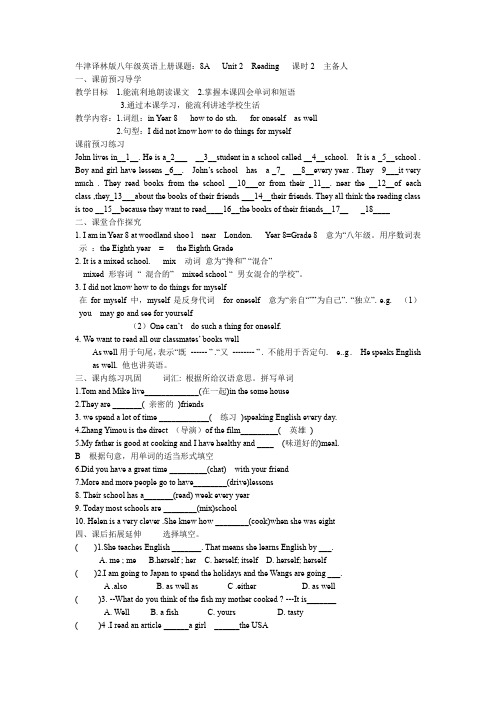
牛津译林版八年级英语上册课题:8A Unit 2 Reading 课时2 主备人一、课前预习导学教学目标 1.能流利地朗读课文 2.掌握本课四会单词和短语3.通过本课学习,能流利讲述学校生活教学内容:1.词组:in Year 8 how to do sth. for oneself as well2.句型:I did not know how to do things for myself课前预习练习John lives in__1__. He is a_2___ __3__student in a school called __4__school. It is a _5__school . Boy and girl have lessens _6__. John’s school has a _7_ __8__every year . They 9___it very much . They read books from the school __10___or from their _11__. near the __12__of each class ,they_13___about the books of their friends ___14__their friends. They all think the reading class is too __15__because they want to read____16__the books of their friends__17__ _18____二、课堂合作探究1. I am in Year 8 at woodland shoo l near London. Year 8=Grade 8 意为“八年级。
用序数词表示:the Eighth year = the Eighth Grade2. It is a mixed school. mix 动词意为“搀和” “混合”mixed 形容词“ 混合的” mixed school “ 男女混合的学校”。
牛津8A Unit 2 Main Task 2

Our gym and basketball court
A big library with a lot of useful books
Discuss your ideal school life in groups according to the questions on the paper, write down the answers
homework
Daniel’s ideal school
Para1
School day time
Para2
starts at 9 a.m and finishes at 3 p.m
an hour for lunch; a big dining hall; eat and chat ; listen to pop music; fruit and vegetables
science
biology(生物)
reading week
play softball buddy club
What activities do we
have in our school?
Sports meeting
Art Festival
Science festival
译林版牛津英语八年级上册 8A Unit2-Reading(2)
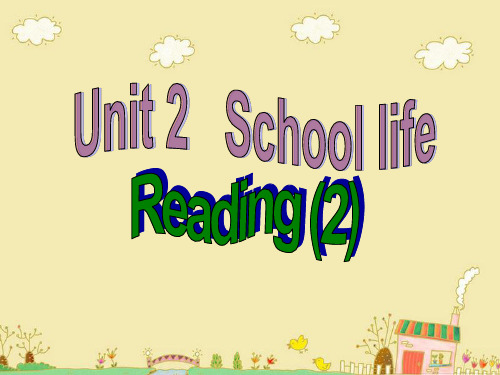
during the summer holiday
7. borrow books from the library 从图书馆借书 borrow sth from sb 向某人借某物
e.g. 我向桑迪借了自行车。 I borrowed the bike from Sandy.
8.One of the _la_n__g_u_a_g_e_s(语言) is the hardest to learn. 9.What a happyva_c_a__ti_o_n_/(h假o期lid)awye had this summer!
10.Jim visited many places of interest _d_u_r_i_n_g_his stay in Beijing. 11.Are theyd_i_s_c_u_s_s_in(讨g 论) buying any presents for their parents? 12.They discussedo_f_f_e_(r自in愿g给予) her some help.
18. play baseball 打棒球 19. practice doing sth 练习做…… e.g. 男孩子们在练习打篮球,女孩子们
在练习跳舞。
Boys are practicing playing basketball and girls are practicing dancing.
every week. 9. She spends __le_s_s___ (少) money on
books than you.
B. 用括号内所给词的适当形式填空。
1. Every day, I spend lots of time p_r_a_c_t_ic_i_n_g_ (practice) _s_p_e_a_k_in__g
八年级英语上册教案:Chapter 2 Language
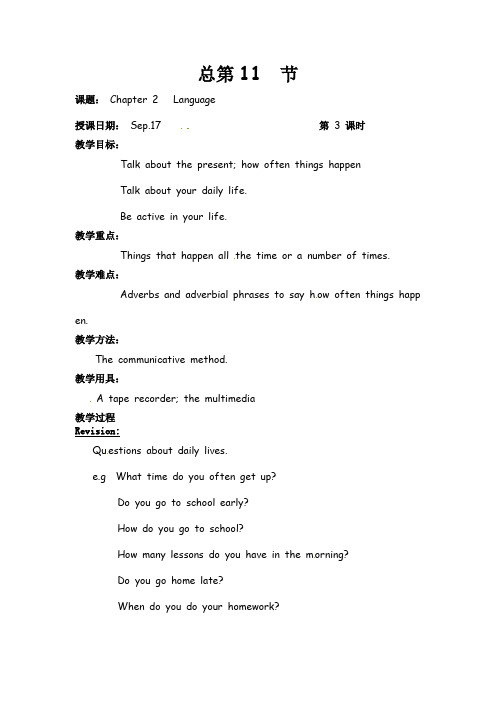
总第11节课题:Chapter 2 Language授课日期:Sep.17第3课时教学目标:Talk about the present; how often things happenTalk about your daily life.Be active in your life.教学重点:Things that happen all the time or a number of times.教学难点:Adverbs and adverbial phrases to say h ow often things happ en.教学方法:The communicative method.教学用具:A tape recorder; the multimedia教学过程Revision:Qu estions about daily lives.e.g What time do you often get up?Do you go to school early?How do you go to school?How many lessons do you have in the m orning?Do you go home late?When do you do your homework?What does your mother often do when you do your homewor k?What time do you go to bed?Presentition:1. Ask the students when we usually talk with the sentences above. Help them to give the summary. They can talk about the question i n their group. And then one of the students can tell their result to the class. Make others from other groups to tell theirs. And then th e teacher give the necessary supplement.Tell them that we talk or write about things that happen all the time or a number of times, we can use verbs in the simple present t ense. For example:I get up at s ix o’clock every morning.She plays basketball on Mondays and Thursdays.Look at “things to remember” and learn to use the correct forms of verb+s.2. We often use adverbs and adverbial phrases to say how often things happen. For example:I always walk to school.She sometimes walks to school.They walk once week.My brother walks every night a fter dinner.Practice:Do the exercises on page 23-26 in class.Students must do the exercises by themselves. Then they can ch eck their answers in their groups. They can ask for help in their gro up when they meet any problem. Then check the answers in the whol e class. The teacher can give some necessary explainations if they ne ed.Drill:Look at the B1 on page 25. After looking through the chart, you can understand “how often” means.课堂小结:Things that happen all the time or a number of times.Adverbs and adverbial phrases to say how often things happen.作业:Learn the new words and phrases by heart.More exercises about the language.难度:B预计完成情况:100%板书设计:Chapter 2 LanguageAll the time a number of times on holiday go to … on holida yIn March do physical esercises do sportsL ose one’s temper = get angry tell the truth课后反思:。
8A chapter2 language
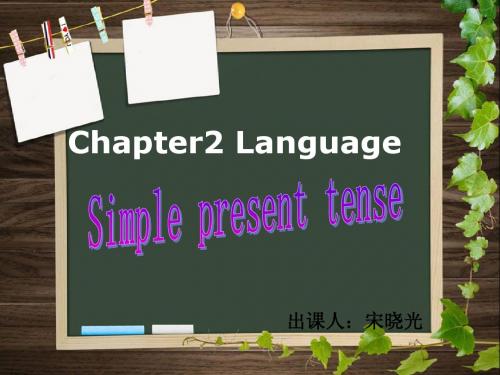
go----goes
do----does
study-----studies tidy----tidies
fly-----flies
play----plays stay----stays
have----has
have got----has got
• 1 王小丫每天都看电视。(watch) • Every day WXY _______TV. watches • 2 李咏一周去游泳两次。(go) goes • Li Yong ______ swimming twice a week. • 3 朱军通常飞往西安。(fly to) flies • Zhu Jun usually _____ to Xian.
Chapter2 Language
出课人:宋晓光
2. Have a quiz
1. 起床 3. 讨论生意 5. 对……负责 7.给某人打电话 9. 考试不及格 2.吃早餐 4.去上学 6.一周一次 8.取得A等的成绩 10. 从……接某人
1 get up
2 have breakfast
3 discuss business
Do you know when should we use the simple present tense?
1.表示现在的状态:
e.g. He’s twelve. She’s at work. 2.表经常或习惯性的动作: e.g. I get up at 6:30 every day. He reads English every morning. 3.表主语具备的性格、爱好和能力等: e.g. She likes singing. They can speak English. 4.普遍真理和自然规律: e.g. Two plus four is six.
8aUnit2Grammar课件

close ____c_lo_s_e_r__ ____c_lo_s_e_s_t __ cheerful _m_o_r_e_c_h_e_e_r_f_u_l _m_o_s_t_c_h_e_e_r_f_u_l bad __w__o_rs_e____ ____w_o_r_s_t____ little ___l_es_s_____ ____l_ea_s_t____ friendly _m_o_r_e__fr_i_e_n_d_ly_ m__o_s_t_f_ri_e_n_d_l_y pretty __p_r_e_tt_ie_r__ _p__re_t_t_ie_s_t_
C. The oldest D.
Amy has some flowers in her hands . Millie has more flowers than Amy. Amy has fewer flowers than Millie.
Daniel
Millie
Daniel has some apples . Millie has more apples than Daniel . Daniel has _f_e_w_e_r_ apples than Millie .
1. John studies _m_o_r_e_ subjects than Nancy,
but he studies _fe_w__e_r_ subjects than me. I
பைடு நூலகம்
study the _m__o_st_ subjects among the three
8A_Unit2PPT2教学文档

every day once a week twice a week three times a week
exercise
read
once a month
twice a month
Activities
watch TV use the Internet
How often
every day
read English books
go to the movies exercise
2c. Get into pairs and fill in the form. Then, make your own conversations.
A: How often do you watch TV? B: I watch TV every day. A: What’s your favorite program? B: It’s Animal World. A: How often do you watch it? B: Once a week.
Benjamin Franklin
早睡早起能使人健康, 富有, 明智。 本杰明 . 富兰克林
3 ____ go to the movies 1 ____ watch TV 5 shop ____ 4 ____ exercise 2 ____ read
go to the movies watch TV shop
I watch TV only on Saturday and Sunday. So I can say I watch TV twice a week.
Once a month Three times a day
Every day Every week
How often do you do these activities?
牛津8AUnit2全部配套教案(译林牛津版八年级英语上册教案教学设计)

牛津8A Unit2全部配套教案(译林牛津版八年级英语上册教案教学设计)Objectives:- To introduce vocabulary used in British English and American English- To distinguish between British and American usage- To sort out vocabularyVocabularyBritish English American English1. American football2. autumn3. break4. corridor5. dustbin6. lift7. film8. football9. ground floor10. Maths11. rubber12. secondary school 1. football2. fall3. recess4. hall5. garbage can6. elevator7. movie8. soccer9. first floor10. Math11. eraser12. high schoolPre-task activities 1. Have my students read the words after the teacher. Pay attention to the pronunciation and the spelling of words.During-task activities 2. Check the answers in pairs, then in class.British English American English13. American football14. autumn15. break16. corridor17. dustbin18. lift19. film20. football21. ground floor22. Maths23. rubber24. secondary school 13. football14. fall15. recess16. hall17. garbage can18. elevator19. movie20. soccer21. first floor22. Math23. eraser24. high school3. Practice.1) Say the words after the teacher.2) Practice in pairs.3) Make sure my students are able to use the words.4. Have my students do Part B, on Page 19.Check the answers in class.Practice reading the words.Post-task activitiesUnit 2 School lives (Pp. 20 – 22) ReadingObjectives:- To guess general meanings from pictures and keywords. - To understand feelings and opinions.- To identify specific information about school life. Language focus:1. life in a British school (l. 1)life in an American school (l. 16)2. in Year 8 (l. 3)in 9th grade (l. 18)3. a mixed school (l. 4)4. have lessons together (l. 4-5)5. my favourite subject (l. 5)6. how to do things for myself (l. 6-7)how to cook healthy and tasty meals7. have a reading week (l. 9)8. bring in books and magazines from home (l. 11)9. the end of each class (l. 12 - 13)10. talk to our friends about our books (l. 13)11. our friends’ books (l. 15)12. as well (l. 15)13. in Denver (l. 19)14. have driving lessons (l. 20)have a driving lesson15. every day 16. twice a week (l. 23)17. play softball (l. 23)18. spend a lot of time practicing (l. 24)19. go to a ‘buddy club’ (l. 24-25)20. at the buddy club (l. 25)21. older students (l. 25)22. enjoy this a lot (l. 26)23. a senior in 12th grade (l. 27)24. help me learn (l. 27)25. help me with my homework (l. 28-29)26. listen to my problems (l. 28)27. my hero (l. 28)my heroes28. during lunchtime (l. 29)29. meet my friends (l. 29)30. have a great time (l. 29)31. talk to each other (l. 29-30)32. go to shopping malls (l. 30)33. after class (l. 30)Pre-task activities Brainstorming and Free discussion: What do you like in our school?What makes you unhappy?Which is your favourite subject?What subjects do you study at school?What subjects do you want to study at school?Do you want to study in Britain?Do you want to study in America?Why?During-task activities 1. Fast readingRead the articles on Page 20 as quickly as possible. Fill in the blanks below.Name John NancySchool Woodland School Rocky Mountain High SchoolGrade 8 9In class(Subject) Home Economics Driving lessonsAfter class(activities) A readin g week Play softball; go to a ‘buddy club’2. Detailed study of the articles and word guessingLife in a British School1) About a mixed schoolWhat kind of school is Woodland School? (A mixed school.) Who studies in a mixed school? (Boys and girls. They have lessons together.)There are some schools for girls only. Is our school a mixed school or not? (Yes, it is.)2) About Home EconomicsHome Economics is John’s favourite subject. It is one of the subjects in Woodland School.What can students learn in this subject? (How to cook healthy and tasty meals. ‘Tasty meals’ means meals with a pleasant taste.)Exercise 1Hi everybodyMy name is John. I am in Year 8 at Woodland School near London. It is a mixed school. Boys and girls have lessons together.My favourite subject is Home Economics. I like learning how to cook and sew. I did not know how to do things for myself before I came to this school. Now, I know how to cook healthy and tasty meals.3) About the reading weekSuppose you are John. Answer my questions:- How often do the students in Woodland School have the reading week? (Every year. = once a year.)- Can the students read all the books from the school library? (Yes, they can.)- What can you bring in (the library) from home? (Books and magazines.)- What must you do if you want to read books and magazines from home? (Tell our English teacher what we are reading. ‘have to’ = ‘must’)- Who can you talk to about your books near the end of each class? (Our friends.)- Do you like the reading week? Do you think it is too long? Why not? (We want to read all our friends’ books as well. ‘as well’ = ‘too’)Exercise 2Our school has a reading week every year. My classmates and I (我和我的同学们)love it. We can read any books from the school library. We can even bring in (把……带来)books and magazines from home but we have to (必须) tell our English teacher what we are reading. Near the end of (在……的结尾)each class we can talk to our friends about (对……谈论关于……)our books. The reading week is always too short because we want to read all our friends’ books as well (也).Life in an American School1) About driving age in the USA- Students at 17 years old are in 12th grade in the USA.- Students in 11th grade can have driving lessons.Exercise 3Hi guys,I’m Nancy and I’m 14 years old. I’m in 9th grade (在九年级)at Rocky Mountain High School in Denver. My brother’s name is Jim. He is 17 years old. He had driving lessons (驾驶课)in school last year. Now, he drives me to school (开车送我上学)every day. This is great b ecause it’s faster than (比……快)taking the bus.2) About softball- When do you play softball?- How often do you play softball?3) About the ‘buddy club’3.1) Home Economics2) Tasty3) As well4) Softball5) Buddy4. Detailed study of the text5.Post-task activitiesUnit 2 Making comparisons (Pp. 26 – 27) GrammarObjectives:- To compare two things using ‘like’ and ‘alike’- To make comparisons using ‘the same as’ and ‘different from’Language focus:Structures:- Amy’s sweater is like Millie’s sweater.- (Amy’s shoes are like Millie’s shoes.)- Amy’s sweater and Millie’s sweater are alike.- My uniform is the same as Simon’s uniform.- My uniform is different from Simon’s uniform.Vocabulary:Words about Stationery: ruler, paper, pencil, rubber, notebooktimetablePre-task activities 1. What are they wearing?Look at the picture on page 26.- How many students are there in the picture? (Four.)- What are they wearing?(Daniel is wearing a yellow jacket and a scarf.)(Simon is wearing sports clothes.)(Amy is wearing a red sweater.)(Millie is wearing a red sweater, too.)- Amy’s sweater is like Millie’s sweater.- Amy’s sweater and Millie’s sweater are alike.Have my students read the sample sentences and remember them.During-task activities 2. Things that are similar1) Have my students do Part C1.2) Check the answers in pairs.3) Ask my students to read the sentences aloud and check the answers in class.3. What stationery do you have?Have my students list the stationeries they have now. T each the word s ‘notebook’ and ‘paper clips’.Post-task activities 4. Things in your school bags.- My pen is like yours.- Our notebooks are alike.Pre-task activities 5. What are they wearing?Look at the pictures on page 27. What are the boys wearing? (They’re wearin g school uniforms.)- Daniel’s uniform is the same as Simon’s (uniform).- Daniel’s uniform is different from John’s (uniform).It’s better to use what my students are wearing as the presentation.During-task activities 6. Same or different?1) Have my students do Part D1.2) Check the answers in pairs.3) Ask my students to read the sentences aloud and check the answers in class.4) Then, go through Part D2 the same way.Post-task activities Exercises on the Workbook:How are their daily lives? (Pp. 26 – 27)Unit 6 An accident report (Pp. 100– 101) Integrated skillsLanguage focus:Vocabulary:1) New words:2) Numbers in EnglishStructure: more … than; fewer … than; less … than1) There are more students in Rocky Mountain High School than in Woodland School.2) There are fewer students in Rocky Mountain High School than in Beijing Sunshine Secondary School.3) Rocky Mountain High School has more students than Woodland School.4) Rocky Mountain High School has fewer students than Woodland School.5) Chinese students have more weeks off in the summertime than British Students.6) British students spend less time doing their homework than Chinese students.Pre-task activities 1. John’s school, Nancy’s school and your school1) Which school is John in? (Woodland School, Britain.)2) Which school is Nancy in? (Rocky Mountain High School, the USA.)3) Which school are you in? (Nanjing No. 13 Middle School.)4) Which class are you in?5) How many students are there in your class?6) How many boys are there? How many girls are there?(There are more / fewer boys than girls in my class.)7) How many students are there in your grade?8) How many students are there in your school? How many teachers?9) How many students / teachers are there in Woodland School / Rocky Mountain High School?During-task activities 2. Numbers of students, teachers and classrooms; length of summer holidayA. Read the chart on Page 28.1) How many students are there in Woodland School? (550.)2) How many classrooms are there in Beijing Sunshine Secondary School? (45.)3) How many classrooms are there in Rocky Mountain High School? (35.)4) How long do the Beijing Sunshine Secondary Schoolstudents have their summer holiday? (7 weeks.)‘long’ & ‘length’B. Listen to the conversation between Sandy and Daniel. Complete the table of Part A1, on Page 28.- There are 550 students in Woodland School.- The students in Beijing Sunshine Secondary School have 7 weeks off in the summertime.D. Structures1) There are more students in Rocky Mountain High School than in Woodland School.2) There are fewer students in Rocky Mountain High School than in Beijing Sunshine Secondary School.3) Rocky Mountain High School has more students than Woodland School.4) Rocky Mountain High School has fewer students than Woodland School.5) Chinese students have more weeks off in the summertime than British Students.6) British students spend less time doing their homework than Chinese students.E. Comparing Schools, Part A2, Page 28.F. Comparing Schools, Part A3, Page 29.Unit 2 Talking about different schools (P. 29) Speak upObjectives:- To develop fluency in asking and answering questions about school.- To develop interactive skills by responding appropriately.- To transfer a model conversation to a personal situation.Language focus:Vocabulary: kilometreStructures:1) How far do you live from your school?How far is it from your home to school?2) Do you walk to school?Do you go to school on foot?3) I usually take the school bus.I usually go to school by bus.4) What if it rains or snows?What are you going to do / do you do if it rains or snows?5) It doesn’t snow / rain, etc.6) I don’t mind the rain.Pre-task activities Mini-task I: How do you go to school?- How do you go to school every day?- How long does it take?1) T – S2) S – SDuring-task activities Mini-task II: How do they go to school?1. Listening task- Daniel goes to school by bus.- John walks to school2. Reading aloudRead after the tape twice.3. Language studies7) How far do you live from your school?How far is it from your home to school?8) Do you walk to school?Do you go to school on foot?9) I usually take the school bus.I usually go to school by bus.10) What if it rains or snows?What are you going to do / do you do if it rains or snows?11) It doesn’t snow / rain, etc.12) I don’t mind the rain.4. Role-playPost-task activities Additional exercises on language points:I. Fill in the blanksNancy: How far do you live from your school?John: About two kilometres.Nancy: Do you go to school on foot?John: Yes, I walk to school every day. I like walking. And you?Nancy: I usually ride my bicycle to school. (I usually go to school by bike.)It’s fun (funny).John: What if your bicycle doesn’t work?Nancy: I don’t mind. I can take a bus then.(I can go to school by bus then.)II. Translation1) The air pollution in Sunshine Town is less than that (the air pollution) in other areas of Beijing.There is less air pollution in Sunshine Town than in other areas of Beijing.2) British students spend less time (in) doing their homework than Chinese students (do).3) How far is your home from your school? About 10 kilometres.How far do you live from your school?About 10 kilometres.4) I don’t mind if it will rain tomorrow.Unit 2 My ideal school (Pp. 31 – 32) Main taskObjectives:- To complete a questionnaire with personal information.- To select specific information for an ideal school week including the choice of favourite activities.- To generate and organize ideas about an ideal school and write an article about it for website audience.Language focus:Vocabulary: finish, tick, baseball, table tennis, tennis, chess, drama, support, ideal, pop, tennis courtPhrases:1. get up late2. my ideal school3. start at 9 a.m.4. finish at 3 p.m.5. have lots of time for after-school activities6. have an hour for lunch7. a big dining hall8. eat lunch and chat9. listen to pop music10. in the hall11. eat fruite and vegetables12. every day13. have Maths14. love computers15. have Computer Studies16. before lunch 17. wear school uniforms18. wear ties19. be quite small20. in each class21. have a park22. on one side23. the other24. have a big library with lots of useful books25. have a tennis court and a swimming pool26. lots of clubs27. after-school activities28. have half an hour of homework29. at weekends30. go on a school trip to a museum or a theatrePre-task activities Mini-task I: Your ideal school1) When does your school start / finish? When do you get up?2) How much time do you have for lunch? What do you do after lunch?3) What subjects do you have every day? How many students are there in your class? Do you have to wear uniforms and ties?4) Where is your school? What is around your school? What is your favourite place in your school?5) What do you do after class? Every month? Every year?During-task activities Mini-task II: Daniel’s ideal school1) Introduction: starting and finishing time of school2) Lunchtime: length, location, food3) Subjects, school uniform and size of classes4) Environment and facilities5) Clubs and activitiesPost-task activities Where do you want to go on with your studies after your leave No. 13 Middle School in 2006?Unit 2 Showing surprise (P. 30) PronunciationObjectivesTo recognize and use intonation patternsTo recognize and use falling voice to indicate the end of astatementTo recognize and use rising voice to show surpriseLanguage focusVocabulary1. monkey n.- Joe wants to get a pet monkey.2. news n.- Did you hear the news?Tense1. Laura hurt her leg on Monday.2. She won’t be able to play basketball for three months.3. Look out the window. It’s snowing!4. Mr. Wu is going to be on TV tonight.5. Joe wants to get a pet monkey.6. You just ate four hamburgers.7. We’ll have cakes for dinner tonight.8. Did you hear the news? Liu Mei is going to move to Canada.I don’t believe it.During-task activities Mini-task I: Poor LauraA. Amy and Sandy are talking about their classmate Laura. Try to fill in the blanks below.Amy: Laura hurt her leg on Monday.Sandy: Oh, really!Amy: She has to stay in hospital for a month.Sandy: A month!Amy: Yes. She won’t be (be) able to play basketball for three months.Sandy: Three months!B. Amy and Sandy are talking about their classmate Laura. Listen to their conversation and fill in the blanks.C. Listen to the conversation. Pay attention to the intonation patterns. Read after the tape.D. Role-playMini-task II: IntonationA. Read the sentences and fill in the blanks.1) Look out the window. It is snowing (snow)!2) Mr. Wu is going to be (be) on TV tonight.3) Joe wants (want) to get (get) a pet monkey.4) I’m hungry.Hungry? You just ate (eat) four hamburgers.5) We will have (have) cakes for dinner tonight.6) Did you hear (hear) the news? Liu Mei is going to move (move) to Canada.B. Read the sentences and put an arrow at the end of each sentence.C. Listen to the tape and check the answers.D. Read after the tape.。
牛津版八年级上册课件 8A Unit2 Grammar 教学课件 (共35张PPT)
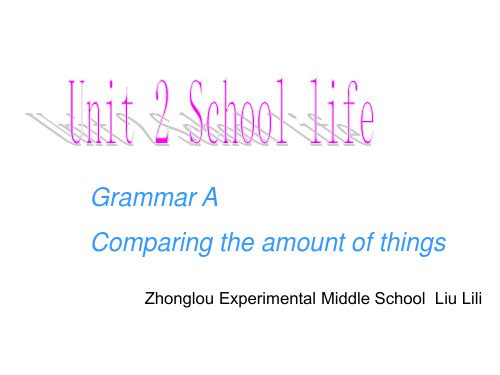
school activities
School life
school trips
homework
school trips
Miss Liu once a year
you twice a year
A: Miss Liu had _fe_w__e_rschool trips _th_a_n__we do. B: We have _m__o_re_ school trips _t_h_a_n__ Miss. Liu did.
At last, _t_h_e_o__ld__m_a_n__g_a_v_e__h_i_s_m__o_n_e_y__to__th__e_t_h_ir_d__s_o_n_.___.
Money: 300
800
3800
In Sanya, we spend the most money.
In Nanjing, we spend the least money.
school activities
Miss Liu
you
seldom
often
A: Miss Liu had _fe_w__e_r school activities t_h_a_n__
we do.
B: We have _m_o_r_e_ school activities _t_h_a_n__
Miss Liu did.
Which city would you choose?
spend more money than in Nanjing
Discuss the changes in Changzhou with your par开思考 的方法 。2021/8/52021/8/5T hursday, August 05, 2021
Unit 2 Using Language第2课时示范课教学课件【人教选必修1】
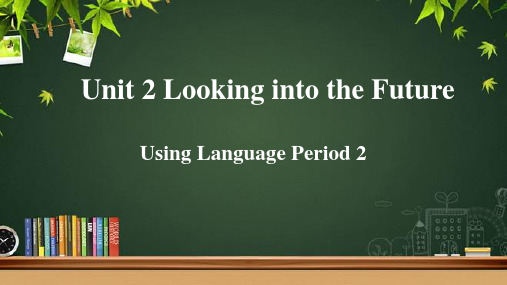
Reading
Fill in the table according to the first paragraph.
Should we fight driverless cars?
Side various people
Attitude Yes
Opinion
... the public should oppose the idea of developing diverless cars.
I have benefited
media network.
quite a lot from
✓ My health monitor, ... get into the best
4
technological
shape media network.
advances.
✓ I will always look on the positive side of
paragraph? ➢ Does the conclusion state the writer’s position?
Assignment
Take your draft back and revise it. Share your essay with us next time.
敬请各位 老师提 出宝贵 意见!
《Unit 2 Using Language》第2课时教学课件【高中英语选择性必修第二册人教版】
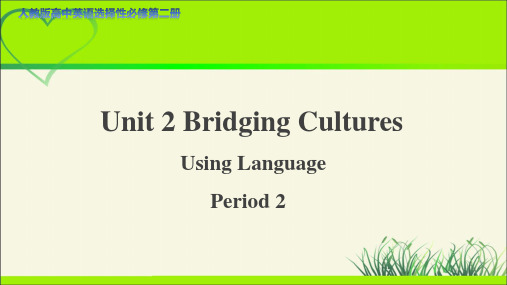
Letter 1although, to begin with, that means, in addition, while, as, to sum up, so
… learn how to live in an unfamiliar environment …;… struggle and suffer from culture shock …;… are not mature enough and may become depressed;… encounter problems with personal safety;… different approaches to teaching and learning …
Unit 2 Bridging Cultures
Using LanguagePeriod 2
Lead-in
These years, more and more students are choosing to study abroad. Do you think it’s necessary to study abroad? Why or why not?
as a result besides for instance that is to say
Students who want to study abroad must consider their parents’ budget. That is to say, they should think about whether they can afford the costs of studying overseas.
- 1、下载文档前请自行甄别文档内容的完整性,平台不提供额外的编辑、内容补充、找答案等附加服务。
- 2、"仅部分预览"的文档,不可在线预览部分如存在完整性等问题,可反馈申请退款(可完整预览的文档不适用该条件!)。
- 3、如文档侵犯您的权益,请联系客服反馈,我们会尽快为您处理(人工客服工作时间:9:00-18:30)。
5. He doesn’t get up at six o’clock..(usually)
___________________________________________________
6. There is good news on TV. (seldom)
3. Jim often______football on TV.
A. watches B.watch C.watchsD. watching
4. Her clothes______always beautiful.
A. isB.amC.areB. be
5. My mother______goes to the cinema.
often经常
sometimes有时
seldom很少,不常
never从来不
例如:On weekends I always surf the Internet.
I usually watch TV.
I often sleep late.
I sometimes listen to music.
I hardly ever play computer games.
频率副词位置记忆口诀:be后,动前,助动间。
课后练习
一、请把括号中的频率副词放到句中适当的位置。
1. She is a good student.(always)
___________________________________________________
2. My mother is late for school.(never)
I exercise once a week.我每周锻炼一次。
I eat McDonald’s twice a month.我一个月吃两次麦当劳。
I visit my grandmother four times a year.我一年去看奶奶四次。
频率副词在句子中的位置
①It is usually hot in summer.夏天通常很热。
总结:频率副词放在_________的后面。
②My father usually goes to work by bus.我爸爸总是坐公共汽车去上班。
总结:频率副词放在_________的前面。
③Tony doesn’t often eat vegetable.他不经常吃青菜。
总结:频率副词放在_________和_________之间。
I never play soccer.
我们按照频率发生的高低,可以将这几个词排列为
always > usually >often > sometimes >seldom> never。
请看下面的图解:
always
usually
often
sometimes
seldom
never
精确的频率副词
以下这些频率副词可以准确地表达事情发生的频率。
三、单项选择。
1.Kate can’t swim, so she ______swims.
A. always ually C.neverD. oping on Sunday?
A.always goes B.always go C.go alwaysD. goes always
___________________________________________________
3. We play in the playground.(often)
___________________________________________________
4. Mike goes to the park.(sometimes)
八年英语导学案
杨士岗九年一贯制学校:主备人:李苗审核人:施颖2012年9月24日
课题
Chapter Two Language
课型
新授课
课时
2
学习目标
1.Master the adverbs we use to say how often things happen
学习重点
Master the new words in the passage
A.doesn’t B.don’t C.neverD. isn’t
6. He __________ hungry after school, so he eats a snack before he goes home.
A. is never B. always is C. never is D.is always
__________________________________________________
7. Is Mr. Wang on time? (always)
__________________________________________________
二、补全句子。
1.托尼一直喜欢生日聚会。Tony ______ ______ birthday parties.
7. I never sleep in class, but my brother _____.
A.does sometimesB.sometimes doesC. never does D.does never
教学
反思
2.我们通常给他送一张生日卡片。We ______ ______ ______ a birthday card.
3.他从来不玩电脑游戏。He ______ ______ computer games.
4.她从未去听音乐会。She ______ ______ to a concert.
5.我妹妹经常买唱片。My sister ______ ______ CDs.
学习难点
Grasp some phrases and sentences.
导学流程
教学过程
教学内容
预习
交流
问题
导学
交流
展示
评价
点拨
巩固
延伸
达标
测试
翻译短语
1.一周一次2.每天夜里
3.在每周二4.一个月两次
频率副词
以下些词都是表示事情发生频率的副词,表示某事在一段时间内发生的次数。
always总是
usually通常
一次once
两次twice
三次three times
四次four times
五次five times
六次six times
注意:在记忆时,我们只要记住once(一次)和twice(二次)就可以了。
其他发生次数只要用“数字+times”来表达就可以了。
例如:I drink milk and eat vegetables every day.我每天喝牛奶,吃疏菜。
